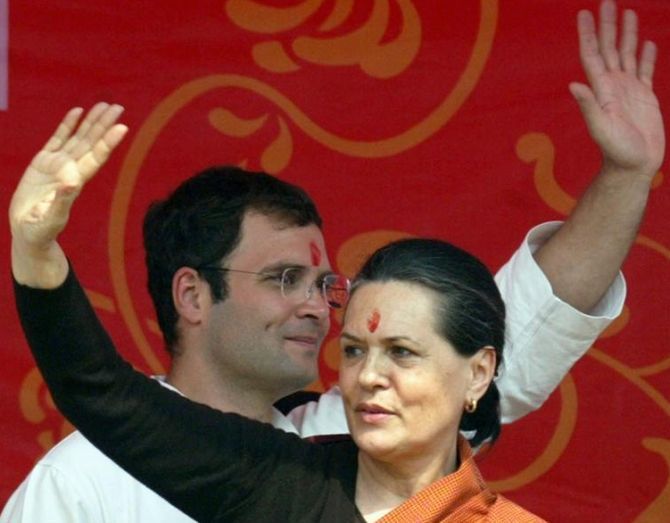'It seems clear that what the Gandhis have done is, if not criminal, at least improper.'
'The fact is that having never had to work for a living, having never had to look for a job like the rest of us, having always lived in government housing their entire lives, it is only natural that they should see no difference between personal property and everything else,' says Aakar Patel.

There is one essential difference between the Bharatiya Janata Party and the Congress. The BJP is like a public limited company in which the shares are held by a large number of people. The Congress is a private limited company in which the shares are held by one family.
It could be said that even the BJP is a tightly held company, because it is associated with the Rashtriya Swayamsevak Sangh, which is also a family of sorts. But there is no insistence on pedigree. The smart outsider stands a good chance of taking over the company on merit, as the prime minister has shown.
In the Congress, no matter how talented the individual, he or she must be resigned to the fact that the top two jobs will never be open to anybody other than the family members.
Secondly, no matter how lacking in talent or competence, since they hold all the shares, the family's performance and actions are never questioned by their employees.
Because of this distinction, the party's members behave in a peculiar fashion. Evidence of this emerged in the last few days, when it was revealed that the Gandhis were facing trial in a property matter.
At first it was said that they would fight it out in court, which was sensible. But later the party said that this issue was political (it very clearly is not) and that they would blame the government for it.
To anyone who looks at the matter, it seems clear that what the Gandhis have done is, if not criminal, at least improper. They are arguing that they did not benefit financially from the transaction and even if it violated some law nobody made any money.
We should not be surprised that they have taken such a casual attitude.
The fact is that having never had to work for a living, having never had to look for a job like the rest of us, having always lived in government housing their entire lives, it is only natural that they should see no difference between personal property and everything else.
The Indian Express reported that before this particular change in strategy, from court battle to political battle, was decided on, Sonia Gandhi was advised by Ghulam Nabi Azad, Ahmed Patel, Bhupinder Singh Hooda, Kapil Sibal and Abhishek Manu Singhvi. Others named in the report were Motillal Vora, Oscar Fernandes and Sam Pitroda.
What is common to all these people? It is, of course, that none of them is in the Lok Sabha. None of them needs to be elected or face the population. Their advice would likely not have been about the political but the personal. Their whispers would have been all concerned with protecting the family and little of it would have been to do with protecting the party and the damage to it.
Nobody in the Congress, of course, has said that the party should distance itself from the matter by letting the family fight it in court and not raising it politically. Anyone who would even consider this, let alone suggest it, would be fired immediately from the Congress. This is another difference it has from the BJP.
It is inconceivable that Narendra Modi would have faced such charges and would not have to deal with internal dissent. Even his inability to win Bihar, despite trying very hard, brought up resentment against him. A charge of financial impropriety would have been difficult to survive. One could say many things about intolerance in the BJP, but it is true that it is far less tolerant about corruption than the Congress.
Since it was decided to make it political, the court case has become another in the long list of things that the Congress has used to disrupt Parliament.
The Congress has been using this disruption as a tool of becoming relevant again. This is fine and all parties use it as a tactic and it is effective. But is flitting from one thing to another sensible? One day it is the alleged corruption of chief ministers and the foreign minister, the next day it is the casual and careless (but definitely not deliberate) remarks of V K Singh, the third day it is intolerance, the fourth day it is this personal court matter, the fifth day it is again corruption.
It boggles the mind that somebody actually thought up this strategy and somebody else approved it.
It is the misfortune of Indians that at a time when a serious debate was needed on some of the doings of the government, the Opposition is serving up this sort of rubbish.
Aakar Patel is Executive Director, Amnesty International India. The views expressed here are his own.
You can read more of Aakar's columns here.
IMAGE: Congress President Sonia Gandhi and Vice-President Rahul Gandhi in Rae Bareli. Photograph: Pawan Kumar/Reuters











 © 2025
© 2025